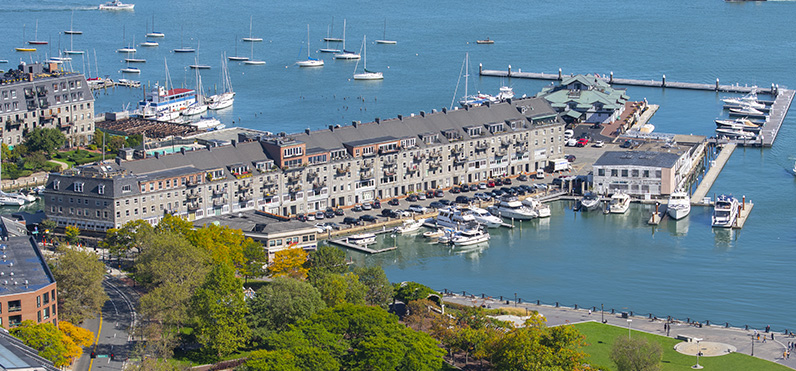Jul 13, 2021
On July 7, the Massachusetts Appeals Court concluded that the Department of Environmental Protection (Department) properly determined that the Commercial Wharf East Condominium (Condominium) unit owners’ use of the 12,000 square feet to the east of the building (disputed area) for vehicular access and private parking is unauthorized, and a license is required under G.L. c. 91, the Commonwealth’s statute that protects the public’s interest in waterways of the Commonwealth.
While many associations have the requisite licensing and/or are on land that was properly released from any obligation to obtain such licensing, vast swaths of the city of Boston contain buildings located on former Commonwealth tidelands, which may be subject to the Department’s jurisdiction
The Condominium is located within the five-story granite building that sits on Boston’s historic Commercial Wharf. Both the granite building and the “streets and passageways” are located at the landward end of the wharf, but seaward of the historic low water mark, in an area constituting “Commonwealth tidelands.”. Under G.L. c. 91, § 1, Commonwealth tidelands are “tidelands held by the [C]ommonwealth in trust for the benefit of the public or held by another party by license or grant of the [C]ommonwealth subject to an express or implied condition subsequent that it be used for a public purpose."
On August 25, 2011, an abutter to the Condominium filed a “request for determination of applicability” pursuant to 310 Code Mass. Regs. § 9.06, asking the Department to determine whether the ongoing use of the disputed area for nonwater-dependent uses by the organization of condominium unit owners, Commercial Wharf East Condominium Association (Association), was authorized under a legislative act or recorded waterways license under G.L. c. 91. In 2012, the Department’s waterways regulation program concluded that the Association’s nonwater-dependent uses of vehicular access and parking were not authorized. The Association filed an administrative appeal, and the Department ultimately issued a final summary decision that rejected the Association’s argument that the use was authorized under state law. The Superior Court affirmed the Department’s decision, which the Association appealed to the Appeals Court.
The Appeals Court decision is highly relevant for any association that is constructed on, or may be constructed on, Commonwealth tidelands – a fact that may not be readily apparent. While many associations have the requisite licensing and/or are on land that was properly released from any obligation to obtain such licensing, vast swaths of the city of Boston contain buildings located on former Commonwealth tidelands, which may be subject to the Department’s jurisdiction. Unfortunately, the mere fact that a use has persisted for half a century is not a guarantee that it is legal or that it can continue. The Appeals Court’s decision highlights this stark reality and provides guidance as to the Court’s analysis when presented with such circumstance.


